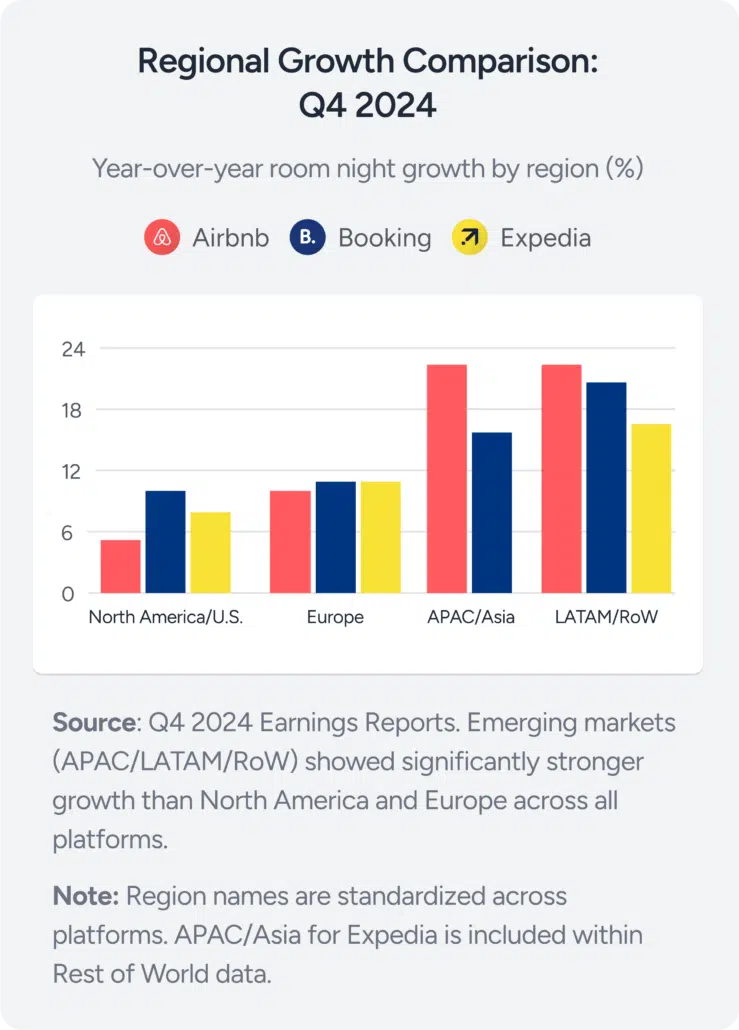The short-term rental industry continues to thrive as global travel demand accelerates despite economic headwinds and geopolitical uncertainties. This is according to the latest earnings reports from the top three online travel agencies: Airbnb, Expedia, and Booking.com. With increased bookings, rising average daily rates (ADRs), and healthy growth across key regions, short term rental and vacation rental businesses should be enjoying an uptick in activity. Read on for in-depth analysis of the Q4/2024 reports and thoughts on how to capitalize on these positive market trends.
Market overview: significant growth signals robust STR industry outlook
The Q4 2024 earnings reports from the leading OTAs show significant growth compared to previous quarters, signaling that demand remains strong despite economic uncertainties.
- Record booking volumes with double-digit growth. All three platforms delivered 12%+ night booking growth in Q4, with Airbnb reporting 111M nights (+12% YoY), Booking.com achieving 86M STR nights (+19% YoY), and Expedia seeing 86.4M nights (+12% YoY). Compared with Q3 (where growth rates were 9-10%), results suggest both resilient travel demand and STRs increasingly capturing market share from traditional accommodations as travelers seek more space and value.
- Pricing power maintained despite economic headwinds. Average daily rates increased by approximately 2% across platforms, with Airbnb reaching $158 ADR. This demonstrates that guests continue to find value in short-term rentals even at premium price points, particularly for high-quality, well-managed properties.
- Strong investor confidence signals industry health: Airbnb’s stock jumped 15% following their earnings release, while Expedia saw a 17% boost and Booking.com held steady. This investor confidence reflects belief in the long-term sustainability of the STR sector.

Airbnb: 12% growth with record performance in emerging markets
While Airbnb’s overall performance aligned with industry trends, a deeper analysis reveals significant geographic variations driving their success. The platform’s growth strategy appears to be increasingly focused on international expansion, with emerging markets delivering substantially higher returns than established territories.
Geographic expansion creating new revenue streams
- APAC region. Low-20% growth in booked nights rate, driven by cross-border travel (+27% YoY), with China’s outbound travel up 25%.
- LATAM region. Low-20% growth with domestic travel surging 30% YoY, and Brazil outpacing other countries.
- Expansion vs. core markets. Growth in expansion markets was more than double that of core markets (U.S., Canada, UK, France, and Australia), which still represent 70% of total GBV.
For 2025, Airbnb has outlined three strategic priorities that will reshape the competitive landscape:
- Perfecting the core service
- What this means for hosts: Airbnb is prioritizing quality, having removed 400,000 substandard listings since April 2023. The company’s Guest Favorites program has already driven 250 million nights booked. Properties that don’t meet quality standards will face increasing visibility challenges in search results as the platform elevates listings with better ratings and lower issue rates.
- Conversion optimization focus: Airbnb’s redesigned checkout experience (currently rolling out) aims to simplify the booking process, which should benefit all listings by converting more browsers into confirmed bookings.
- Quality optimization strategy: STR managers should prioritize achieving Guest Favorite status and align checkout processes with Airbnb’s optimizations. Guesty helps improve the guest experience and thus the reviews, increasing the probability of achieving Guest Favorite status.
- Accelerating growth in global markets
- What this means for hosts: Airbnb is implementing localization strategies, including local payment methods like Pix in Brazil.
- Market expansion advantage: Property managers should leverage multi-language capabilities and region-specific pricing strategies, particularly targeting travelers from China.
- Launching and scaling new offerings
- What this means for hosts: Airbnb plans to invest $200-$250 million in new teams, marketing, and new products development, potentially creating new income streams beyond the basic nightly rate.
- Platform evolution on the horizon: Airbnb appears to be targeting significant expansion in 2025 and beyond. The investment could be in support of the company’s vision to extend into new travel-adjacent verticals. While details remain limited, property managers should monitor these developments closely.
Co-Host Network impact. The rapid expansion of Airbnb’s Co-Host Network (15,000 co-hosts managing 100,000 listings) validates professional property management. These properties earn approximately twice as much revenue as comparable listings, with 85% qualifying as Guest Favorites. This program’s expansion to Japan and Korea in the coming months signals Airbnb’s commitment to professionalizing hosting services.
Expedia Group: strategic shift with renewed focus on Vrbo
Expedia Group reported impressive Q4 results with lodging GBV growing 12% year-over-year to $17.2B, driven primarily by hotels (+14%) but with Vrbo showing significant momentum. Room nights increased 12% to 86.4M, with booked nights growing at high single digits in the U.S., low double digits in Europe, and high teens elsewhere—highlighting the success of their international expansion efforts.
Strategic priorities reveal opportunity for STR managers
- Quality-focused supply strategy. Rather than focusing solely on adding listings, Expedia is emphasizing quality improvements for existing Vrbo properties, including better flexibility, cancellation policies, and promotions. For property managers, this signals the importance of optimizing listing terms and policies to stand out in an increasingly quality-driven marketplace.
- Targeted loyalty program investment. With nearly 50% of room nights across Expedia’s core brands coming from silver, gold, or platinum members (up 7% YoY), the company is strategically investing in loyalty to drive repeat bookings. This represents a significant opportunity for STR managers on Vrbo, as these travelers can apply their accumulated Expedia Rewards points toward vacation rental bookings. Properties that highlight their eligibility for loyalty point redemption can attract these high-value travelers who might otherwise default to hotels to utilize their rewards.
- Regional performance disparities. The significant variation in booking growth rates across regions (high single digits in the U.S. vs. high teens in emerging markets) creates opportunities for managers with properties in international destinations to capitalize on this stronger demand growth.
Reading the tea leaves for Vrbo. Vrbo’s sequential acceleration in both traffic and conversion rates suggests that Expedia’s investment in the platform is yielding results. The company noted that the one million properties added last quarter have meaningfully contributed to Vrbo’s recovery, yet management’s comments about “winning back lost travelers” indicate a strategic focus on recapturing market share rather than just adding inventory.
For property managers using Guesty’s platform, these insights suggest prioritizing quality enhancements and guest experience improvements will be more valuable than simply focusing on competitive pricing, especially for properties targeting loyal Expedia/Vrbo users.
Booking.com: Sustained STR momentum continues to outperform hotel segment
Booking.com reported particularly impressive results for short-term rentals, with STR nights surging 19% year-over-year in Q4 (accelerating from 14% in Q3) and significantly outpacing their hotel growth. With STRs now representing 33% of all nights booked — up 1 percentage point year-over-year — and supply growing 8% to reach 7.9 million properties, Booking.com is positioning itself in the alternative accommodations space.
Seizing the multi-channel opportunity. This accelerated growth presents a prime opportunity for property managers to diversify their distribution strategy. Property managers can capitalize on this growth momentum by ensuring their properties are strategically listed across multiple platforms, maximizing visibility and booking potential.
Loyalty programs driving repeat business across all OTAs. An interesting trend we’re seeing with Expedia and Booking.com is a focus on loyalty programs. Booking.com reported that Level 2 and 3 Genius members now account for over 50% of their total room nights and represent more than 30% of active travelers.
For STR operators, this signals that repeat guests and loyalty program members are becoming increasingly valuable acquisition targets. Property managers should consider:
- Guest retention strategies that complement these loyalty programs, including personalized welcome amenities for repeat guests or program members.
- Promotional activities that highlight benefits relevant to loyalty program members, such as flexible cancellation policies or premium amenities that appeal to frequent travelers.
- Pricing strategies that remain competitive for loyalty program members, recognizing that while these guests may return to the platform, they’re primarily loyal to the OTA rather than to individual property managers.
Regional growth variations create targeting opportunities
Booking.com’s regional growth varied significantly, with Europe up 10-12%, the U.S. up approximately 10%, Asia up 15-16%, and the rest of the world up approximately 20%. For property managers with listings in high-growth regions, leveraging tools that optimize listing performance across multiple channels will be crucial for capturing this expanding demand.

What this means for property managers: Actionable strategies for 2025
As travel demand accelerates across all OTAs, property managers have a significant opportunity to scale their businesses and capture market share. The key insights from these earnings reports point to several strategic imperatives:
Implement dynamic pricing to maximize revenue. Property managers need sophisticated pricing algorithms that can adapt to rapidly changing market conditions. Advanced price optimization technology that analyzes real-time demand patterns, competitive rates, and seasonal trends can help managers capture premium rates during high-demand periods while maintaining occupancy during slower seasons.
Capitalize on cross-platform loyalty trends. With 50%+ of OTA bookings now coming from loyalty program members, property managers need robust CRM systems to identify repeat guests across platforms and deliver personalized experiences that complement these loyalty initiatives.
Leverage quality metrics to gain visibility. As platforms prioritize quality over quantity, successful managers must continuously monitor critical performance indicators across all channels, ensuring listings maintain the competitive edge needed for preferred placement.
Scale through automation and efficiency. In an increasingly competitive landscape, workflow automation has become essential for scaling a property portfolio without proportionally increasing staff costs — critical for maintaining profitability as the industry professionalizes.
Diversify geographic exposure. With significantly higher growth rates in APAC and LATAM markets, property managers should consider multi-language capabilities and regional marketing strategies to effectively serve these expanding traveler segments.
Optimize distribution based on platform strengths. As each OTA develops distinctive advantages, a sophisticated channel management approach allows managers to fine-tune their property positioning on each platform to capitalize on these different booking patterns.
As platforms elevate quality requirements, the property managers who thrive will be those who leverage Guesty’s comprehensive platform to deliver exceptional guest experiences while maintaining operational discipline.





